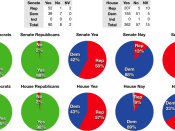Patricia Dunn was on the hunt for a leak within HP. As Chairman of the Board she took on the responsibility of finding the person who was leaking the information. While conducting her investigation she made several moral decisions that raise questions about her ethics and values. She is considered to be the mastermind behind the pretexting allegations which violated the privacy of HP's Directors and various Journalists (Kaplan, 2006). Since then, she has been forced to resign and many people are questioning if she should have been. By examining the utilitarian and deontological ethical considerations of her actions, the answer becomes evident. Patricia Dunn should have been forced to resign because she made unethical moral decisions and broke the law which ultimately led to damaging HP's reputation.
When Dunn was put in a position to protect HP and find the person leaking the information she was unsuccessful. She then became so outraged that she was forced to hire an outside firm (Kaplan, 2006).
The firm engaged in pretexting, in which they lied in order to obtain personal information about Directors and outside Journalists (Rasch, 2006). Dunn, if not aware of the tactics used by the firm, became aware shortly after and eagerly attempted to use the evidence found against the accused person (Kaplan, 2006). This is just as bad as instigating pretexting.
Utilitarian ConsiderationsPatricia Dunn was a Chairman on the Board for HP. She was in a position where her decisions were powerful and utilitarian considerations were greatly needed. When she made the decisions to engage in pretexting or ignore the pretexting tactics by the firm she failed to think about the utilitarian aspects.
When she decided to engage in the invasion of privacy, she was not considering the consequences to her community. She was only thinking about...


